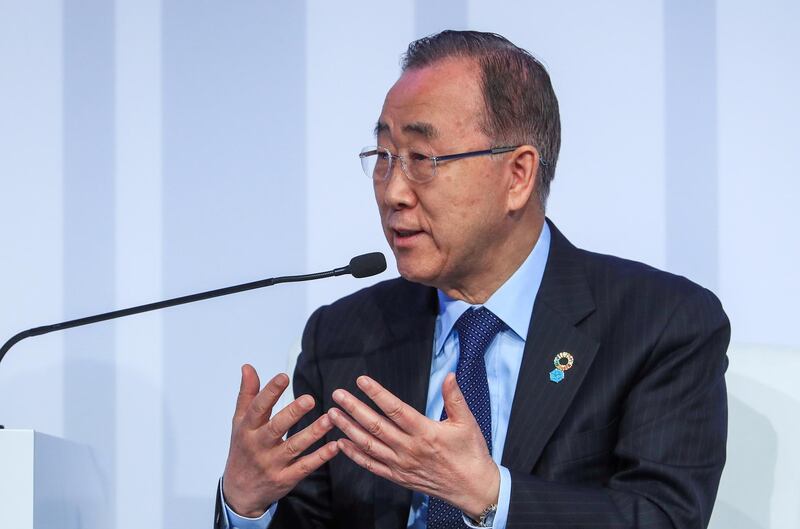People across the world are dying "needlessly" as government's focus on international conflicts rather than creating a sustainable future for the planet, a former secretary general of the United Nations has said.
The spread of war, terrorism and extremism is a roadblock to achieving wide-ranging sustainable goals, said Ban Ki-moon, who served as the UN's secretary general between 2007 and 2016.
Speaking at the Future Sustainability Summit as part of Abu Dhabi Sustainability Week, Mr Ban admitted progress had been “somewhat mixed” towards achieving the UN’s Sustainable Development Goals, which were developed while he headed the UN and were rolled out across the globe in 2015.
The 17 goals set targets in areas such as climate change, education and hunger, and are seen as one of the major legacies of Mr Ban’s tenure.
He said meaningful progress had been made in areas such as reducing poverty and child mortality, as well as increasing accessibility to electricity and clean water. However, he insisted there is more world leaders could do, claiming many had become distracted by military interventions.
“We have some negative sides,” Mr Ban said. “Because of continuing military conflicts, extremism and terrorism spreading around the world, the governments and people have not been able to engage wholly with the Sustainable Development Goals. That’s why still, there are more and more people who are suffering from abject hunger, many people die needlessly still.
“There are still 60 million children who are out of school, in the 21st century. Maybe by 2030 the international community’s situation will be much, much better. I have been really focusing on this and urging world leaders to have a stronger ownership. This has left the United Nations and is in the hands of world leaders and each and every government.
“There must be a political will by the leaders and also stronger ownership. In each G-7 summit and G-20 summit, I have been urging the political leaders to establish a taskforce which can oversee and co-ordinate between countries.”
Delegates in Abu Dhabi were also addressed by world leaders, with the Presidents of Mali and Angola in attendance.
_________________
Read more:
Special report: How the Zayed Future Energy Prize helped to light up the lives of children in Malawi
Record number of entries for Zayed Future Energy Prize
Abu Dhabi campaign shines a light on sustainability vision
____________________
The diplomat said that it was important that rich countries, like the UAE, provide support to poorer countries to help them meet development targets, which he descried as “the most ambitious, far reaching vision the United Nations has ever presented to the international community”.
Mr Ban, 74, is now president of the Global Green Growth Initiative, which he said is working hard to ensure developing countries get the help they need.
He stressed that other countries can learn from the UAE, which he described as a “strong supporter” of the UN goals and praised the country for providing leadership throughout the Middle East and North Africa. He also said the UAE is “investing wisely” in addressing climate change.
Mr Ban ended his address by calling on the youth and civil society to be willing to challenge their political and business leaders. “We have many global challenges,” he said. “Global challenges require global solutions. Not a single individual or group of countries can do it alone.
“Our challenges are enormous. Climate change is happening and approaching much, much faster. Look at the extreme weather patterns which have happened recently.
“So we are all in this together. Really we have to mobilise our whole resources and wisdom. That is my message to political leaders, business leaders and also civil society leaders.
“Civil society leaders here – you have the pejorative to challenge your political leaders and business leaders. Also young people who are here, you should also challenge your political leaders.
“Just make sure, the leaders, that this world should be managed in a sustainable way for succeeding generations. Unless we work together, with a stronger partnership – government, business and civil society - I think we cannot do it.
“But I’m sure that the awareness and commitment is much, much stronger than 10 years ago. So let us hope for the best and work together to make this world better for all,” he said.






